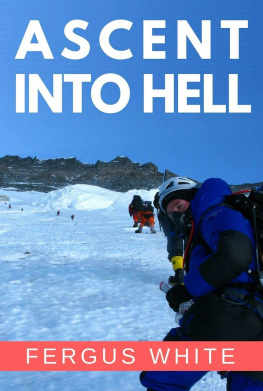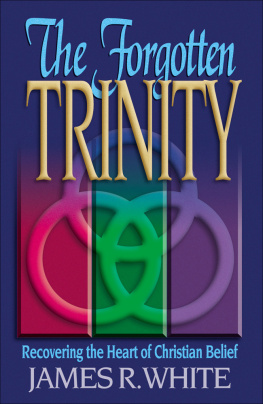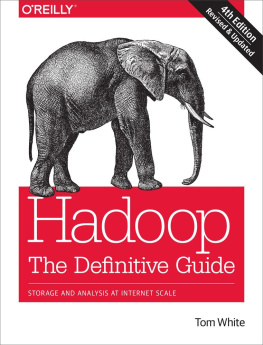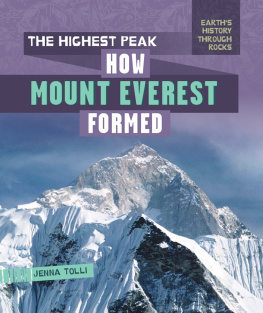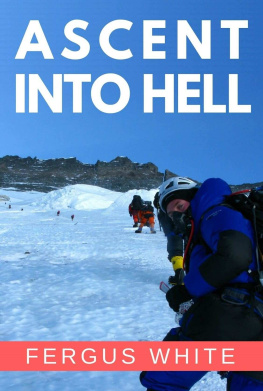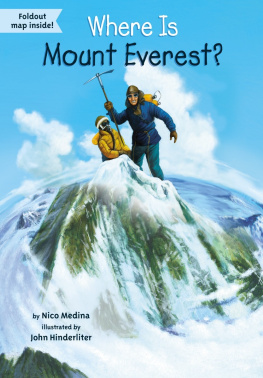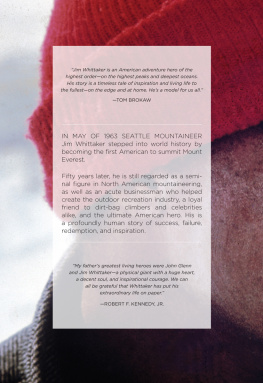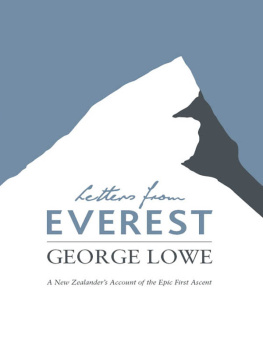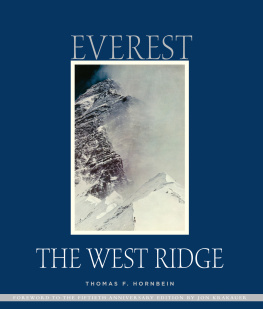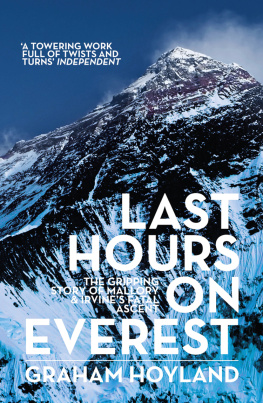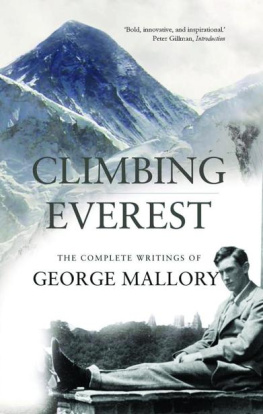White - Ascent Into Hell: Mount Everest
Here you can read online White - Ascent Into Hell: Mount Everest full text of the book (entire story) in english for free. Download pdf and epub, get meaning, cover and reviews about this ebook. year: 2017, genre: Detective and thriller. Description of the work, (preface) as well as reviews are available. Best literature library LitArk.com created for fans of good reading and offers a wide selection of genres:
Romance novel
Science fiction
Adventure
Detective
Science
History
Home and family
Prose
Art
Politics
Computer
Non-fiction
Religion
Business
Children
Humor
Choose a favorite category and find really read worthwhile books. Enjoy immersion in the world of imagination, feel the emotions of the characters or learn something new for yourself, make an fascinating discovery.
- Book:Ascent Into Hell: Mount Everest
- Author:
- Genre:
- Year:2017
- Rating:5 / 5
- Favourites:Add to favourites
- Your mark:
- 100
- 1
- 2
- 3
- 4
- 5
Ascent Into Hell: Mount Everest: summary, description and annotation
We offer to read an annotation, description, summary or preface (depends on what the author of the book "Ascent Into Hell: Mount Everest" wrote himself). If you haven't found the necessary information about the book — write in the comments, we will try to find it.
Ascent Into Hell: Mount Everest — read online for free the complete book (whole text) full work
Below is the text of the book, divided by pages. System saving the place of the last page read, allows you to conveniently read the book "Ascent Into Hell: Mount Everest" online for free, without having to search again every time where you left off. Put a bookmark, and you can go to the page where you finished reading at any time.
Font size:
Interval:
Bookmark:
Ascent Into Hell
Fergus White
ISBN (paperback): 978-1-97342271-6
Copyright Fergus White, 2017
The right of Fergus White to be identified as the author of this work has been asserted by him in accordance with the Copyright & Related Rights Act, 2000.
No part of this publication may be reproduced, copied, stored in a retrieval system, or transmitted, in any form or by any means, without the prior written consent of the copyright holder.
Cover photograph of the author by Greg Jack.
Photographs by Angel Ezequiel Armesto, Blake Elliott, Greg Jack, Khalid Al Siyabi, Penba, Roger, and the author.
The Climbers
Ted (Canada): Team leader, Everest summiteer, professional mountain guide
Angel Ezequiel Armesto (Argentina): Team guide, professional mountain guide
Hugo Searle (Wales): Team guide, firefighter in the USA
Mingmar Sherpa Salaka Okhaldhunga 6 Damar (Nepal): 3 Everest summits, professional mountain guide
Ade (UK): Oil exploration
Amit Kotecha (UK): Dentist
Charlene (Scandinavia): Quit banking career to focus on Everest climb
Doug Stuart (USA): Firefighter captain
Greg Jack (USA): Surgeon
Khalid Al Siyabi (Oman): IT expert for education ministry
Linda (Canada): Nursing
Matthew (Australia): IT
Martin McHugh (UK): Construction business
Nurhan (Turkey): Everest summiteer, professional mountaineer, author
Nigel (UK): Businessman
Pete Solie (USA): US Air Force, retired space and missile operator
Roger (Scotland): Oil industry
TC (Canada): Second attempt at Everest, physical education professor
Yener (Turkey): Professional mountaineer
Fergus White (Ireland): IT consultant for banks
BECAUSE ITS THERE
April 1
Into the Himalayas
T his is a one shot only deal. I stare at the pilot in front of me. If he lands short, hell hit a cliff that drops six hundred metres into the valley below. If he needs a go-around on this final approach, hell smack the high terrain at the end of the runway. Through the windscreen I glimpse the short tarmac of the Tenzing-Hillary airport at Lukla. The encircling mountains, thin air, and its four hundred and fifty metre sloping strip have crafted one of the toughest landings in the world. The History Channel classifies it as the most extreme airfield on the planet.
The small plane is not pressurised. Twenty of us fill it. I smell aviation fuel. Flying in at over 3,500 metres, I already feel a little groggy. I trust the pilot is doing better.
Im thrown forward with the sudden deceleration. Above the propeller noise, the tyres screech on the runway. Were down. Weve stopped. I glance around and share a smile with my fellow travellers. I wont admit it to them, but Im relieved to be out of the sky. At an altitude of 2,800 metres on the edge of the Himalayas, weve thrust deep into the rural heartland of Nepal.
We kicked off at 5am in Kathmandu. Sleep had not come quick last night. It wasnt the hotel; it was me. My mind wouldnt switch off. I knew today wouldnt be just another day. A year ago I set myself a target. This airport is an accumulation of events that finds me eight thousand kilometres from my home in Dublin and within eighty kilometres of my goal. The maths suggests ninety-nine per cent of the voyage is behind me, but not so. Those first several thousand kilometres were the easy ones.
With every metre that we ascend from here, the comforts of Western living will fade into memory. As we climb higher, well penetrate a region where no culture has ever survived. Well enter an inhospitable environment, where only the briefest of visits is possible before escaping. Many who try do not make it that far. Of those who succeed, not all return.
I trained here last year. We attempted to summit the 7,100 metre Mount Pumori, seven kilometres from Everest. The expedition lasted a month. We failed. We reached 6,300 metres, at which point the leader decided the snow conditions were too dangerous. That ruling annoyed some of the mountaineers on the team; they wanted to risk the summit. But the judgement had been made and no doubt for good reasons. The mountain had already thrashed me. I more or less passed out twice on the day we retreated. Three weeks of depleted oxygen, poor food, worse appetite, and blinding headaches had left me but a shell. Grabbing only a few hours of sleep each night, in a subzero tent, had accelerated my bodys collapse.
Most of the team on that trip suffered stomach disorders. Stronger men than me exhausted their supplies of anti-nausea tablets early. One climber recounted how hed swallowed his last remaining pill and then vomited again a minute later. Alone in the dark outside his tent, he rifled through the dust and bile, by the light of a head torch, to find the undigested capsule. At the time it struck me as hard core, but not now. When the going gets rough up here, mountaineers do whatever it takes to survive. Dignity is an early casualty. Ive already written mine off; I know whats ahead. I hope Ill act with integrity, but Im under no illusions. Virtue untested is no virtue at all. This isnt Hollywood, where heroes perform brave acts and bask in a rewarding finale. This is the real deal. When it hits the fan, and it will, I fear I might not acquit myself as a gentleman.
April 1
Trek from Lukla (2,800m) to Monjo (2,800m)
Carry your bags?
Porting service, porting service!
Outside the fence of the tiny airport, scores of Sherpas clamour for business. Trekking and climbing pay the wages in this region. These men earn eleven euros a day to lug thirty kilograms of equipment uphill. Judging by their fervour, they know bleaker ways to make ends meet.
We push through; transport of our mountaineering gear and tents, by yak, has been arranged in advance. Well rejoin our duffle bags at Everest Base Camp, 2,500 metres above this spot. For now, well each just carry a backpack with a weeks kit.
Well hike up through valleys for eight days to Base Camp. Were planning a slow ascent with time for acclimatisation. No prizes will be handed out for sprinting. No one brushed aside Hillarys accomplishment to inquire as to how long he took.
Head into that teahouse, Ted says. Theyre expecting us. Well take thirty minutes.
Ted leads teams up mountains in the Himalayas, Africa, and America for a living. In his mid-forties and about five foot nine inches, a lifetime of outdoor activities presents a trim physique, the envy of many men his age. This wilderness is his office. Hell bump into many old friends these next two months. He led the training climb up Pumori and ended it on making the call to retreat. He broke a rib on that trip; a chunk of falling ice whacked him through his tent as he slept.
From Canada, hes spent decades as a mountain guide, ski instructor, and outdoor medic. Hes scrambled in the Himalayas forty times and climbed on ten Everest expeditions. He reached the summit once and joined the small elite whove stood at 8,848 metres. When tough decisions have to be made over the next two months, itll be he who does so and therell be little dissent.
His team of sixteen climbers, plus two guides, pass flasks of tea across tables. Another six mingle with us and will do so for the next ten days. They aim to summit a mountain called Island Peak. It soars up to 6,100 metres; although, only the last few hundred require crampons. If four of the group clamber to the top, well count that as a success. Such is the hardship of performing day to day functions above 5,000 metres that at least one of them may not even get to step on snow.
To complement our numbers, six trekkers will hike up the valleys alongside us. They hope to see Everest and experience a night at Base Camp.
Noise builds in the hostel as the mugs of tea disappear and final adjustments are made to backpacks and boots. Most of us only knew one or two of the others before we met up in Kathmandu two days ago.
Next pageFont size:
Interval:
Bookmark:
Similar books «Ascent Into Hell: Mount Everest»
Look at similar books to Ascent Into Hell: Mount Everest. We have selected literature similar in name and meaning in the hope of providing readers with more options to find new, interesting, not yet read works.
Discussion, reviews of the book Ascent Into Hell: Mount Everest and just readers' own opinions. Leave your comments, write what you think about the work, its meaning or the main characters. Specify what exactly you liked and what you didn't like, and why you think so.

